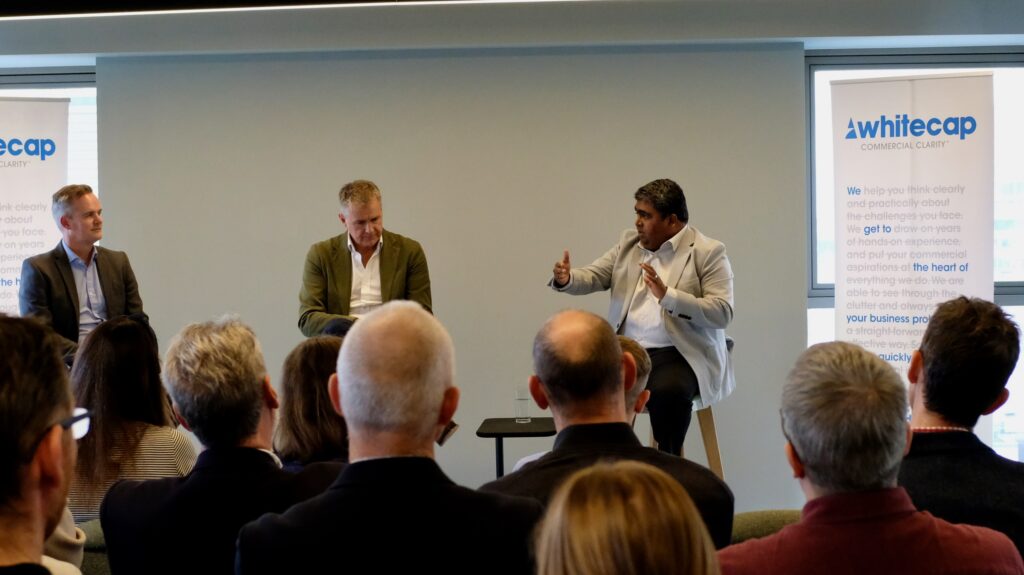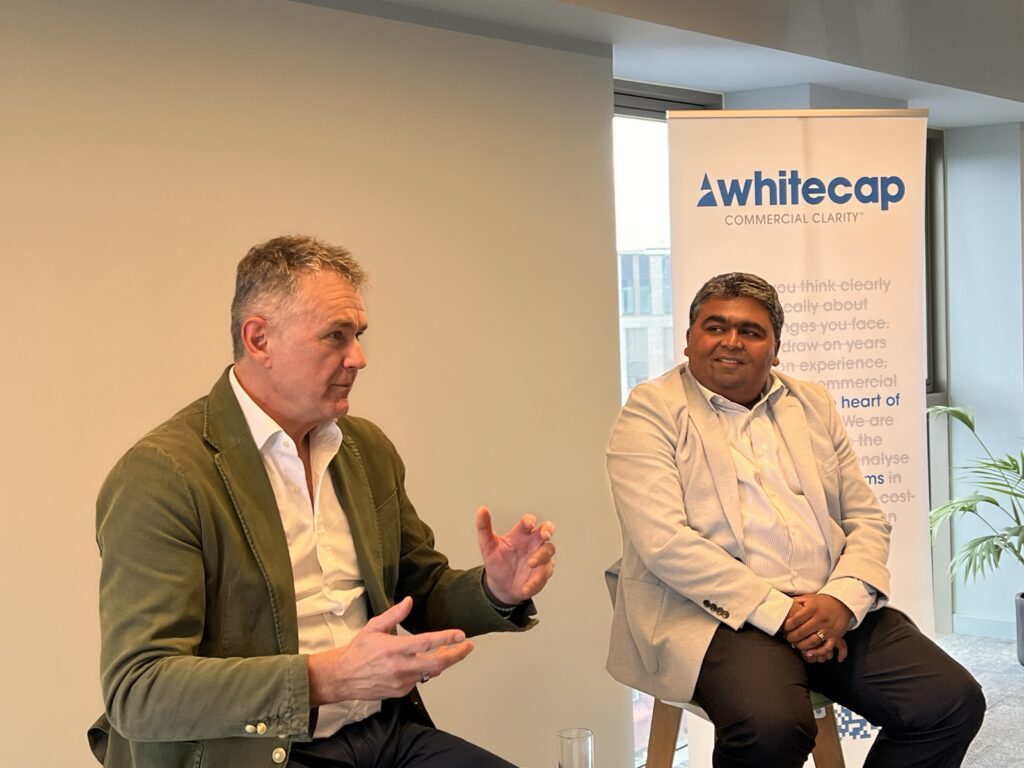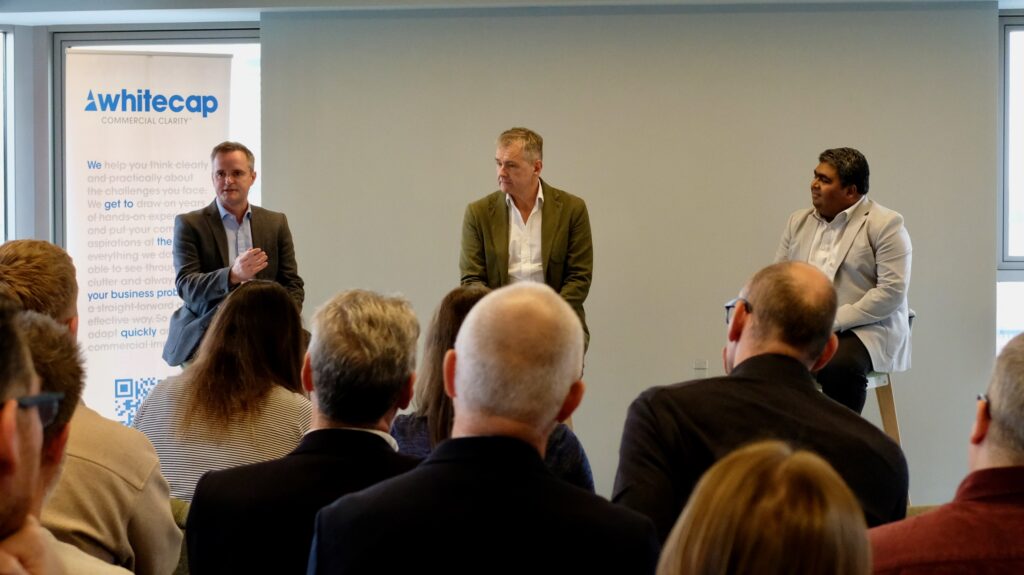
The session was chaired by Julian Wells, Director at Whitecap , with speakers Sarat Pediredla, CEO at hedgehog lab and Richard Carter, CEO at Lenvi.
Opening Remarks: Setting the Tone for Technology-Driven Strategy
The event commenced with a warm welcome from Katherine Megson of Bruntwood SciTech, introducing attendees to their newest office space in Leeds West Village, which celebrated its official opening later in the week.
Richard Coates, Managing Director at Whitecap Consulting, followed with an introduction that framed the central theme of the day: the interplay between business strategy and technology.
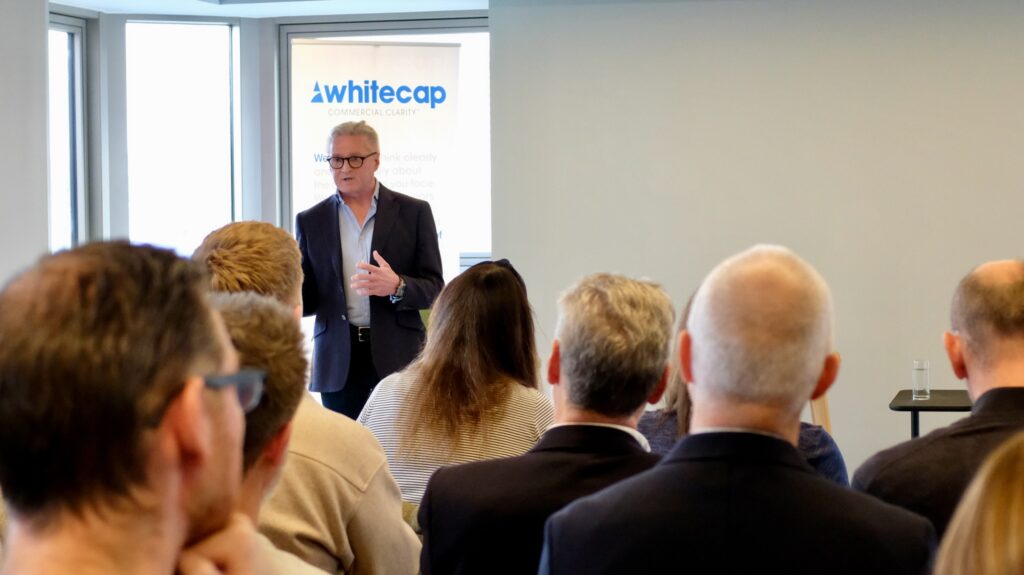
Richard highlighted that while technology and digital enablement is crucial for an organisation’s success, it cannot be the dominant driver. Referencing the famous quote attributed to Peter Drucker, ‘culture eats strategy for breakfast,’ he suggested if he were commenting today, perhaps he (or others) could say: ‘technology eats strategy for breakfast.’
He then challenged this notion, explaining that a solid business model and strategy are essential to fully realise the benefits of any technological innovation.
‘So why is this relevant… and also not correct?
Because an organisation can have great tech and digital solutions, but if the business model is not right, and the strategy of the business is not correct, or optimised, then no matter how good the tech is, the organisation won’t achieve its full potential or long-term strategic ambitions.’
This set the stage for the day’s discussions, exploring how technology can enable business strategy rather than dominate it.
Accidental Journeys to Leadership
The panel discussion, led by Julian Wells, began with the panellists, Richard Carter and Sarat Pediredla, sharing their personal journeys to becoming CEOs — both describing their paths as ‘accidental’ and somewhat reluctant.
Richard, who was previously a sales and marketing director, spoke about the unexpected challenges of the CEO role, noting that while the influence and authority can be rewarding, the pressure and responsibility can make it a tough position to occupy. His reflections struck a chord with the audience, many of whom could relate to this duality.
Sarat shared his journey as a co-founder, initially reluctant to take on the role of CEO but eventually stepping into it out of necessity. He humorously described his experience as ‘drawing the short straw’, a sentiment that resonated with many in the room.
The Evolution of Leadership in Technology Driven Businesses
One of the key topics explored was the evolving role of technology in business leadership. Sarat remarked on the shift from a tech-focused industry to one that prioritises people and culture.
‘I think it is probably the most interesting change I’ve seen, the focus on culture as a key driver to deliver those tech benefits.’
In professional services, he explained, ‘people are your product’, and the success of any tech strategy ultimately hinges on the workforce. Sarat shared how hedgehog lab has focused on creating a culture that empowers talented individuals to do their best work.
‘At hedgehog lab, our purpose is to create a place that empowers talented people to do the best work of their lives. We used to think tech was everything, but now, the conversation has shifted to looking after your people. Tech is only as good as the team behind it.’
Richard echoed these views, highlighting how tech innovations tend to come in waves, with AI being the latest trend. He noted that while AI garners significant attention, it’s the people behind the technology who drive meaningful change.
‘It comes in waves, but fundamentally, underpinning all of that is technology, and what really underpins technology are the people. Your greatest asset can walk out the door at the end of the day — the key is ensuring they want to come back.’
Both panellists agreed that a strong organisational culture is critical to successfully leveraging technology.
Staying ahead of Market Trends
When Julian Wells asked how the panellists stay on top of market trends, both Richard and Sarat shared their approaches to maintaining a forward-looking strategy.
Sarat emphasised the importance of ‘chasing the hype’ in the professional services industry, explaining that his company’s annual ‘big bets’ keep the team motivated and engaged with the latest trends, such as AI.
Richard described Lenvi’s ‘Innovation week’ approach, where the team is encouraged to experiment with new technologies. This has not only fostered learning but also led to practical applications that improved the company’s operations.
Both CEOs emphasised the importance of staying ahead of trends to remain competitive and foster innovation. However, they approached this from different perspectives: Sarat saw it as an opportunity for growth and excitement, while Richard viewed it more as a necessity to stay competitive in an increasingly crowded market.
Leadership Development: A Pressing Challenge
The conversation then turned to leadership development, a key concern for both panellists. Sarat spoke about the ‘leadership vacuum’ in the tech industry, where many are thrust into leadership roles without adequate training.
Sarat stressed it’s one of the biggest challenges – ‘You know, it keeps me up at night, because if you talk about challenges like my biggest worry is, how do we develop the next generation of leaders.’
Richard expanded on this, suggesting that leadership is about more than just roles, it’s about creating both leaders and followers within an organisation. He discussed the importance of fostering accountability and responsibility, and the power of ‘imperfect leadership,’ where authenticity and trust matter more than striving for unattainable perfection.
Balancing Short-Term Gains and Long-Term Strategy
Another central theme was the tension between short-term success and long-term sustainability, particularly in relation to investor expectations. Both Richard and Sarat highlighted that while technology can drive business growth, it is essential to ensure that it aligns with a long-term strategy. Focusing solely on short-term tech trends without a broader business context can lead to failure. Both speakers stressed the importance of understanding market demand and differentiating through service delivery.
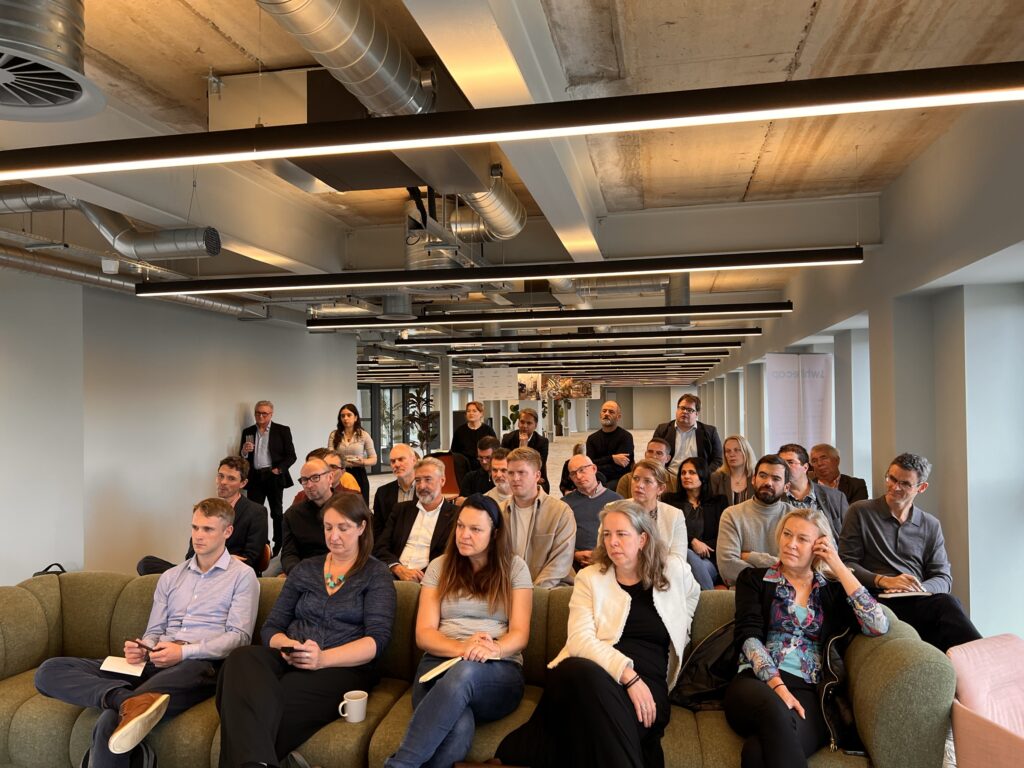 Lessons in Leadership: Advice for Aspiring CEOs
Lessons in Leadership: Advice for Aspiring CEOs
As the forum drew to a close, the panellists were asked to share their advice for aspiring CEOs. Richard emphasised the importance of having a formal, diverse board and seeking out mentors and coaches to provide guidance. He also highlighted the need for self-awareness and the ability to delegate effectively, particularly as the organisation grows.
Sarat offered practical insights into strategic planning, encouraging CEOs to focus on their strengths and avoid distractions. He referenced research showing that CEOs typically have the shortest tenure among C-suite executives, underscoring the need for a realistic and well-informed strategic plan.
Conclusion: Reflections on Leadership and Innovation
The CEO Strategy Forum offered a rich discussion on the challenges and opportunities facing business leaders today. Through personal reflections and professional insights, the panellists highlighted the critical importance of aligning technology with broader business strategies, fostering leadership, and maintaining a forward-looking approach to innovation.
As the session concluded, attendees were left with plenty to reflect on, from the evolving role of technology in business strategy to the challenges of cultivating strong leadership and culture. The forum embodied the spirit of the Leeds Digital Festival, providing a valuable opportunity for CEOs to connect, share experiences, and discuss the future of leadership in a tech-driven world.
The format of the event provided popular, and we are likely to repeat it over the coming months. If you’d like to join us at (or participate in) our next CEO Strategy Forum get in touch or follow our socials to keep up to date with our latest activity, LinkedIn, Eventbrite.
